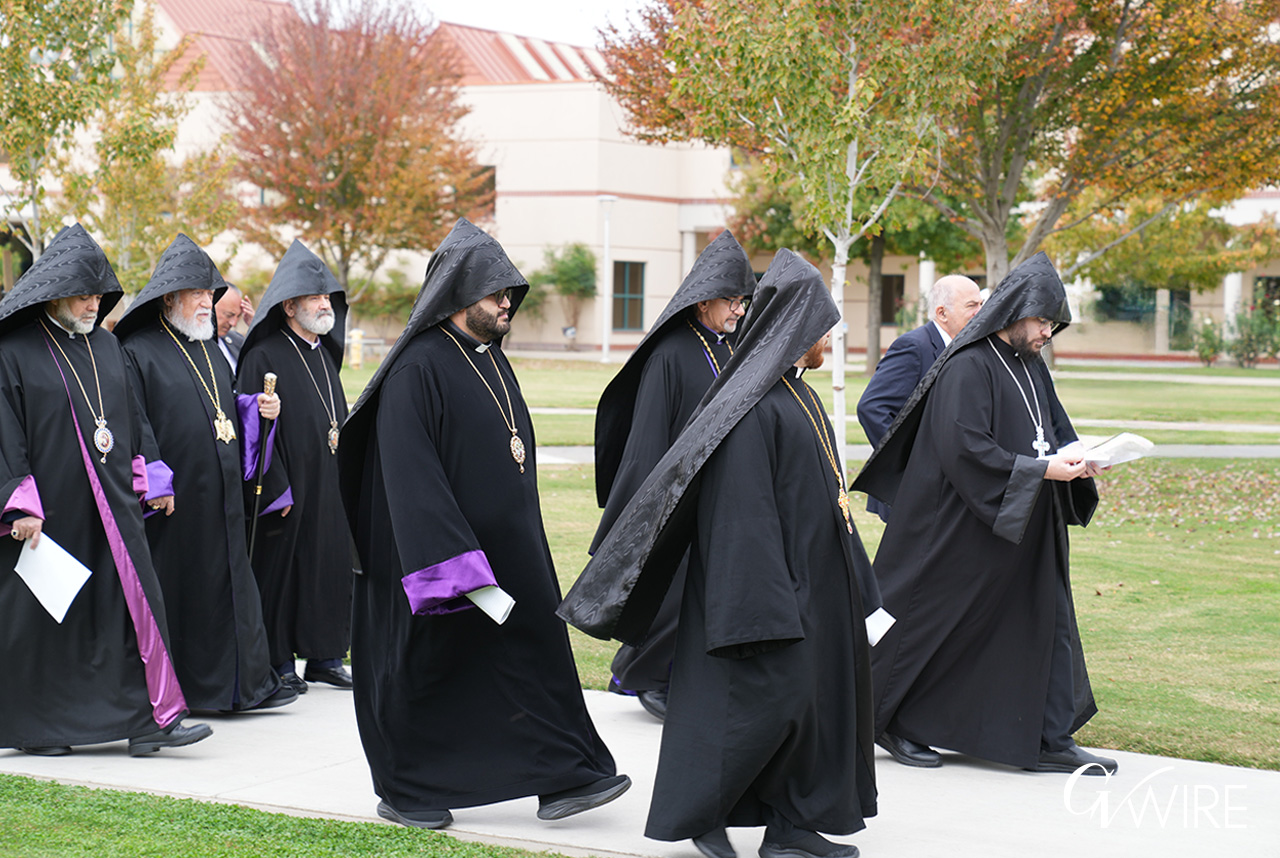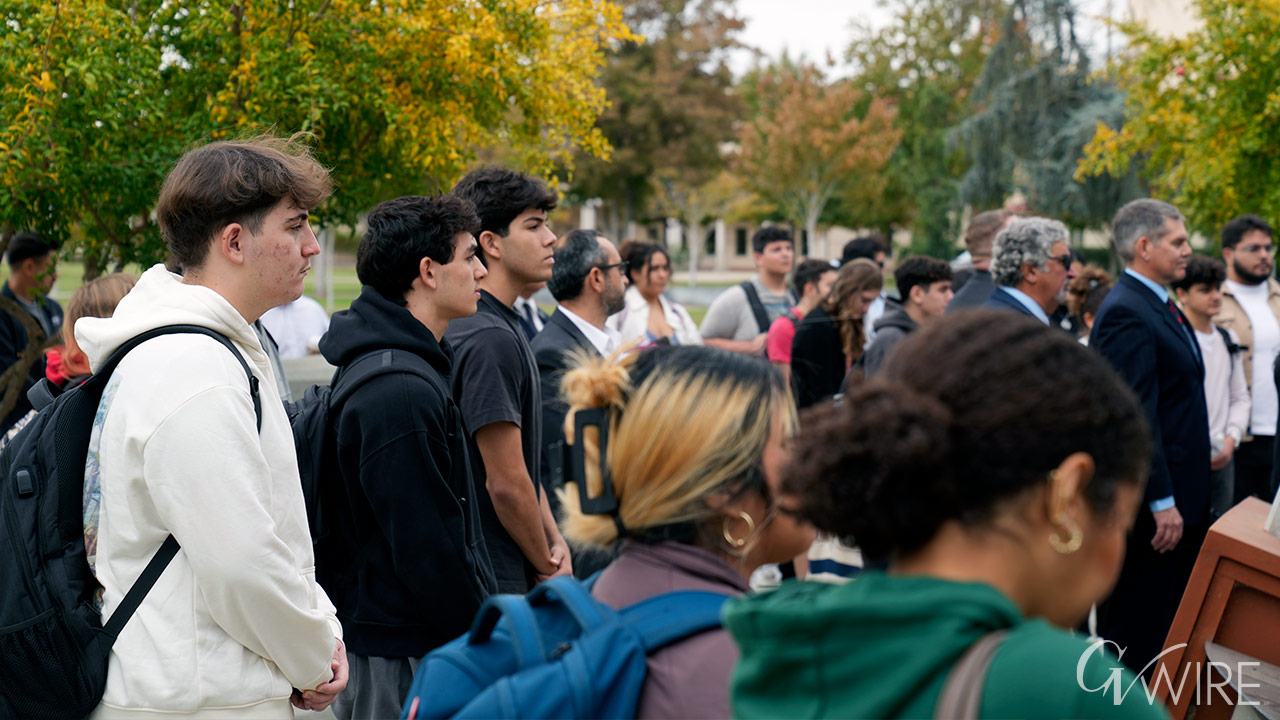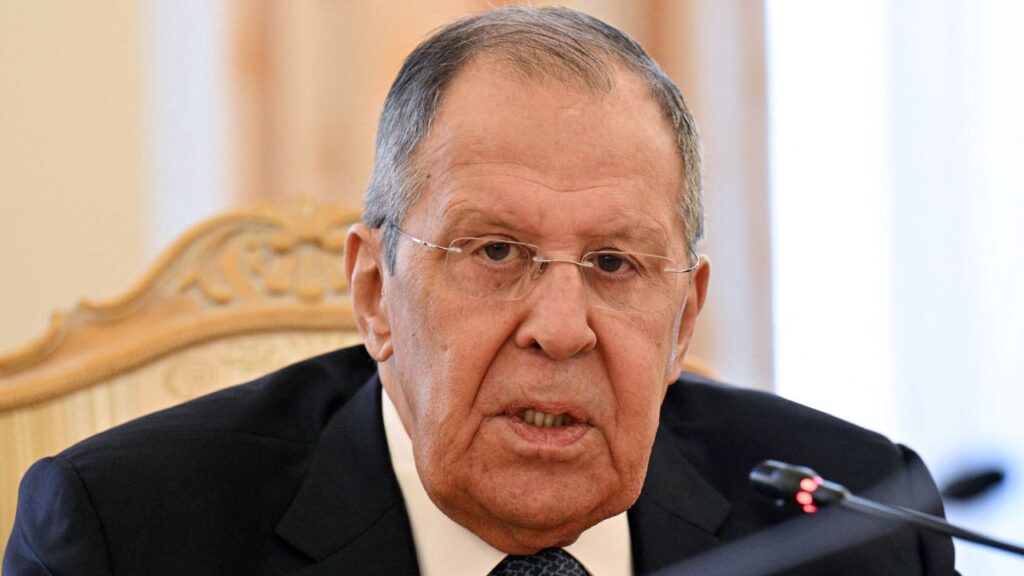Aram I, Catholicos of the Armenian Church at Fresno State, along with archbishops of the ancient church, offered prayers and blessings for victims of the Armenian Genocide at the monument at Fresno State. (GV Wire Video/Edward Smith/Jahz Tello)

- Aram I, Catholicos of the Armenian Church, Holy See of Cilicia, visited the Armenian Genocide Memorial at Fresno State Wednesday.
- Aram spoke of the need to recognize the Armenian Genocide in order to serve justice.
- Aram, the day before the visit, spoke of the importance of the youth and the ideas and progress they bring.
Share
|
Getting your Trinity Audio player ready...
|
Prayers from the head of the global Armenian church Wednesday for the 1.5 million killed during the Armenian Genocide emphasized justice and unity during the religious leader’s visit to Fresno State.
Aram I, Catholicos of the Armenian Church, Holy See of Cilicia visited the Armenian Genocide Memorial at Fresno State.
Alongside archbishops from the ancient church — recognized as the first national Christian church in the world — Aram gave a hokehankist, a special prayer for those who have passed away, in this case, victims of the genocide.
“The genocide is deeply rooted in the cultural consciousness of our people. Wherever they are, they relive the consequences of the genocide,” Aram I said. “The United States of America has been for justice, for human rights. It is our expectation that all nations and all people of good will should support the Armenian cause, which is a cause of justice.”

Religious or Secular, Aram’s Visit a Reminder of Armenian Identity
Having one of the two highest leaders of Apostolic Church in Fresno serves as a reminder for the community that they are part of the worldwide community, said Barlow Der Mugrdechian, Berberian Coordinator of Armenian Studies at Fresno State.
Der Mugrdechian coordinated the visit by Aram, who is based in Lebanon.
“It’s a huge honor to have a Catholicos, a patriarch, any of the high-ranking members of the Armenian church to come here is, simply put, a privilege,” Der Mugrdechian told GV Wire. “It represents the worldwide Armenian community.”
Founded in 301 A.D., the Armenian Apostolic Church became the first state Christian church. After the Armenian population in Cilicia, modern day Turkey, was destroyed in 1915, the church relocated to Lebanon, sharing leadership with the church still in Armenia.
Fresno State student and former president of the Armenian Students Organization Harutyun Amirkhanyan said for students regardless if they’re religious or secular, the leader’s presence reminds them of their struggle and their identity.
“In this crucial moment, hearing a religious leader, a pillar of the Armenian community talk about the unity gives some solace that’s it not only about me, it all the Armenians in this situation,” Amirkhanyan said. “The only way to overcome this is to work together, to be united.”

Aram I an Advocate of Diversity, Role of Youth in Preserving History
Varoujan Der Simonian, executive director at the Armenian Museum of Fresno, said the visit to Fresno State plays into the message Aram had about the young people’s role in preserving history.
Der Simonian heard the Catholicos speak at a reception Tuesday.
Aram said of the youth, according to Der Simonian: “Our youth are challenged to play a pivotal role in all aspects and spheres of our community life. They are experts. They also know the world with all its complexities and opportunities ups and downs. They want to replace stereotypes and ossify thinking by new perspectives. We must encourage them and provide them with a broader space for more active engagement.”
Preserving the past provides a source to avoid future mistakes. Following the Armenian Genocide came the Holocaust, genocides in Cambodia, Rwanda, Darfur, and what is happening in Gaza, Der Simonian said.
“It may or may not be on the same level, but it’s similar,” Der Simonian said. “The intent is you are wiping out another race for your personal or your economic interest.”
Based out of Lebanon, Aram I works closely with the Muslim majority and is a strong supporter of inter-religious dialogue, according to his biography on the Armenian Orthodox Church website.
He helped reorganize the Christian-Muslim Committee of the Middle East Council of Churches in June 2005.
“If you understand the moralistic religions of Christianity, Judaism, or Islam, the basis of all those religions are very, very similar to each other,” Der Simonian said. “How to make a person a better human being to serve the society, each in its own way. Once you understand the concept of it, you’ll appreciate the other person.”
RELATED TOPICS:
Categories


















